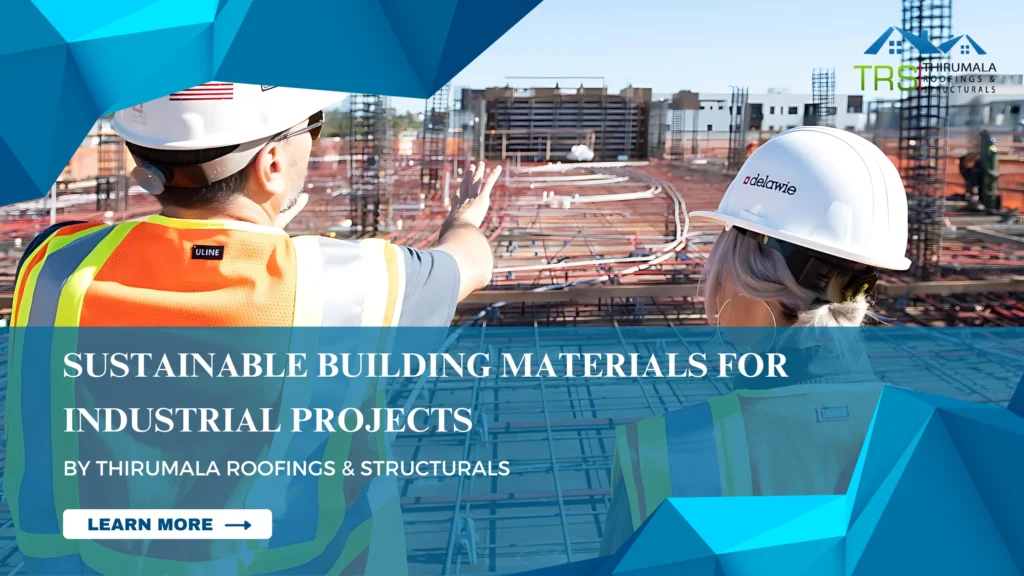Sustainable Building Materials for Industrial Projects: Building a Greener Tomorrow with Thirumala Roofings & Structurals
In today’s rapidly evolving construction landscape, sustainability has become more than just a trend—it is a necessity. As industries worldwide continue to grow, so does the need for infrastructure that is efficient, long-lasting, and environmentally conscious. One of the primary steps toward achieving this goal lies in the selection of sustainable building materials. For industrial projects, this decision can significantly impact energy efficiency, operational cost, and environmental footprint.
Responsible construction is a priority for Thirumala Roofings & Structurals. Our commitment to sustainability is reflected in every product we deliver, especially in the use of Pre-Engineered Buildings (PEBs) that incorporate advanced, eco-friendly materials. The purpose of this article is to explore the various sustainable materials that are revolutionizing industrial construction and their significance.
Why Sustainable Building Materials Matter
Industrial structures demand durability, strength, and cost-effectiveness. However, they must also adhere to modern environmental standards. The design of sustainable building materials involves reducing energy consumption, minimizing waste, and encouraging recycling and reuse.
Key benefits include:
- Energy Efficiency: Many sustainable materials offer high thermal insulation, reducing the energy load for heating and cooling.
- Reduced Carbon Emissions: Eco-conscious materials produce fewer emissions during manufacturing and operation.
- Durability: Longer lifespans mean less frequent repairs or replacements.
- Cost Savings: Although the initial investment may be higher, sustainable materials often result in long-term savings on energy and maintenance.
Top Sustainable Building Materials Used in Industrial Construction
1. Steel – Recyclable and Robust
Steel remains a foundational element in industrial construction, especially in PEB structures. One of its greatest advantages is its 100% recycling and quality assurance. Recycled steel reduces the demand for virgin ore mining and consumes significantly less energy during production.
At Thirumala Roofings & Structurals, we use high-quality, recycled steel for fabricating our pre-engineered buildings. The result is a strong, reliable, and environmentally responsible framework that supports large-scale industrial needs.
2. Insulated Sandwich Panels
The core insulation layer (such as PUF or mineral wool) is inserted between two metal sheets to make these panels, which are frequently utilized for walls and roofing. They offer exceptional thermal insulation, reducing HVAC energy consumption. Their light weight also reduces the load on structures and foundations, resulting in a decrease in material utilization.
We recommend our PUF Panel Installation Services for industries looking to enhance their building’s energy efficiency.
3. Cool Roofing Sheets
Cool roofs are better at reflecting heat and absorption of sunlight than conventional roofing materials. These sheets have a significant effect on indoor temperatures and reduce air conditioning by using high-reflectivity paints and coatings.
Thirumala Roofings & Structurals offers specially designed cool roofing solutions that combine sustainability with durability.
4. Low-VOC Coatings and Paints
Volatile Organic Compounds (VOCs) in traditional paints and coatings can harm indoor air quality. Low-VOC alternatives provide excellent protection from weathering and corrosion, while also being safer for workers and the environment.
Our coatings are carefully selected to ensure low environmental impact without compromising on quality.
5. Recycled and Eco-Friendly Concrete Alternatives
In industrial construction, concrete is a common material, but its environmental costs are high. Alternatives like fly ash concrete or geopolymer concrete significantly reduce carbon emissions while maintaining structural integrity. These materials repurpose industrial by-products and offer a greener option for foundations and flooring.
Pre-Engineered Buildings and Sustainability
PEBs are inherently more sustainable than traditional construction. Their design and manufacturing process are streamlined to minimize waste and maximize material usage.
Some advantages of PEBs include:
- Precision Fabrication: Components are manufactured in controlled environments, reducing onsite waste.
- Quick Assembly: Shorter construction timelines mean reduced emissions from equipment and transportation.
- Reusability: PEB structures can often be disassembled and reused in new locations.
Explore our complete Pre-Engineered Building Services to discover sustainable solutions tailored for industrial environments.
How Thirumala Roofings & Structurals Champions Sustainability
With decades of experience in industrial construction, we take pride in offering turnkey solutions that prioritize both performance and the planet. Our services are designed to reduce environmental impact from the ground up. Here’s how:
- Eco-Conscious Sourcing: We partner with suppliers who align with our sustainability goals.
- Customized Designs: Our engineering team designs structures that optimize material usage and energy performance.
- Innovative Roofing Solutions: We provide industrial roofing options that improve thermal efficiency and minimize heat gain.
- End-of-Life Planning: We offer dismantling and recycling solutions for old structures, ensuring minimal landfill contribution.
We invite you to explore our diverse offerings in Industrial Roofing and Construction Services for more information.
Applications of Sustainable Materials in Various Industries
From manufacturing plants to logistics hubs, every sector can benefit from the adoption of eco-friendly construction materials. Here are some common applications:
- Warehouses: The interior climate and stored goods are maintained and protected by the use of insulated roofing and wall panels.
- Cold Storage Units: Low temperatures can be maintained with minimal energy input using PUF panels and cool roofs.
- Automobile Plants: Heavy-duty operations are supported by steel structures with sound insulation and ecological flooring.
- Food Processing Units: Hygienic, low-VOC surfaces and controlled environments enhance food safety and operational compliance.
Long-Term Benefits of Using Sustainable Materials
Even though the initial costs may seem higher, the long-term benefits are considerable:
- Lower Utility Bills: Energy consumption can be reduced with enhanced insulation.
- Reduced Maintenance: Durable materials result in fewer repairs.
- Government Incentives: Many green buildings qualify for tax benefits and grants.
- Brand Image: Sustainability-conscious companies are favored by clients, partners, and investors.
Final Thoughts
The transition to sustainable building materials is not just about environmental ethics—it’s about building smarter, longer-lasting, and more cost-effective structures. Thirumala Roofings & Structurals has taken on the role of leading this transition in the industrial construction industry, and we are proud to be a part of it.
Whether you’re planning a new warehouse, factory, or cold storage unit, our team will guide you toward greener alternatives that don’t compromise on quality.
Our objective is to build sustainable structures that help create a better tomorrow.
For detailed consultation, visit our contact page and speak with our team today.

